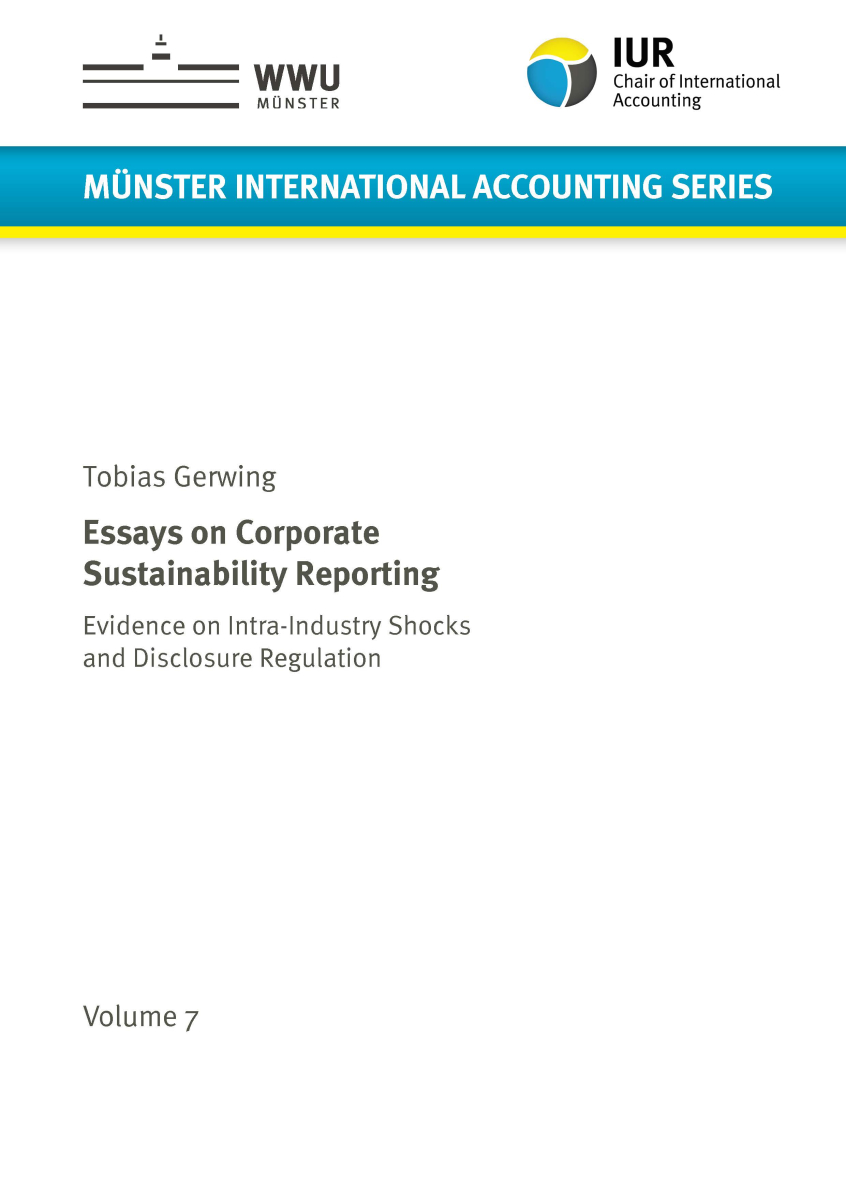Volume 7
Tobias Gerwing - Essays on Corporate Sustainability Reporting - Evidence on Intra-Industry Shocks and Disclosure Regulation
 In recent decades, society’s awareness of the importance of sustainable behavior has increased significantly. The growing sustainability awareness also changes stakeholders’ attitudes toward firms’ behavior. In contrast to the past, stakeholders increasingly demand that firms act in a sustainable manner. This is also observed in relation to investment behavior. Even in shareholder-oriented countries such as the United States, investors have currently invested more than USD 17 trillion in sustainability investment funds, which constitutes an increase of 42% compared to 2018.
In recent decades, society’s awareness of the importance of sustainable behavior has increased significantly. The growing sustainability awareness also changes stakeholders’ attitudes toward firms’ behavior. In contrast to the past, stakeholders increasingly demand that firms act in a sustainable manner. This is also observed in relation to investment behavior. Even in shareholder-oriented countries such as the United States, investors have currently invested more than USD 17 trillion in sustainability investment funds, which constitutes an increase of 42% compared to 2018.
Consequently, there is an increasing ambition of both investors and other stakeholders to put pressure on firms to be accountable for their impact on the environment and society. Firms respond to this pressure by voluntarily engaging in corporate sustainability reporting. Therefore, firms provide information on areas in which they have to explain or justify their actions to stakeholders, for example, with regard to environmental and social issues, corruption, employee treatment, and human rights.
Moreover, the 2008/09 global financial crisis as well as corporate scandals such as the Volkswagen emissions scandal or the recent Wirecard scandal have resulted in additional stimuli for corporate sustainability reporting. Such crises and misbehaviors damaged stakeholders’ confidence in firms’ behavior and business activities, leading to increased mistrust in firms’ abilities to act in line with society’s expectations. This mistrust is not only directed toward the individual firms that caused the scandals (trigger firms), but also to entire industries, which are put under general suspicion. That is, even potentially innocent firms operating in the same industry (peer firms) can be affected. In many cases, this “contagion effect” of a corporate scandal gives rise to an intra-industry shock. The risk of being negatively affected by corporate scandals - directly or indirectly via a contagion effect - raises the question of how firms can counter these negative effects. Considering contagion effects, firms have incentives to (i) prevent corporate scandals from (re)occurring, (ii) minimize the collateral damage from a corporate scandal, and (iii) regain trust after they are put under increased scrutiny. Therefore, the firms have incentives to invest in risk management strategies and may use their social capital to minimize the risk of being affected by a corporate scandal. In this context, the use of sustainability information may build social capital and, thus, constitute a tool for risk management.
Given the importance of corporate sustainability, the three studies of this thesis address various aspects in the area of reporting on corporate sustainability. The first study “CSR Disclosure and the Contagion Effects of Corporate Scandals” analyzes the consequences of intra-industry shocks in the form of firm value effects. This study focuses on capital market reactions for industry peer firms following corporate scandals and investigates whether corporate sustainability reporting can act as an insurance for peer firms. Specifically, this study analyzes if the existence and the quality of peer firms’ CSR disclosures mitigate negative spillover effects of corporate scandals within an industry.
Given the relevance for firms to be recognized as legitimate, the second study “How do Peer Firms Restore Legitimacy after Industry-wide Scandals?” provides a comprehensive analysis of how firms can use corporate sustainability reporting to restore their legitimacy after an intra-industry shock. Specifically, this study examines the case of the Volkswagen emissions scandal to explore the legitimacy losses following the scandal, real actions and disclosure responses taken by firms to restore their legitimacy, and the effectiveness of these legitimacy-restoring actions.
The third study “The Role of Corporate Governance in Mandatory Sustainability Reporting Quality” focuses on disclosure regulation and investigates the association between corporate governance and the quality of mandatory sustainability reporting. The study builds on the EU’s CSR Directive (2014/95/EU) and uses the German national transposition with the CSR Directive Implementation Act of 2017 as the regulatory setting. The study identifies relevant corporate governance mechanisms and analyzes the association between these mechanisms and the quality of mandatory sustainability reporting.
Collectively, the three studies provide a comprehensive overview on the effectiveness of corporate sustainability reporting as a risk management strategy before a corporate scandal occurs, how corporate sustainability reporting can be used to counter the negative effects arising from an intra-industry shock, and how firms and regulators can ensure the quality of mandatory corporate sustainability reporting.


